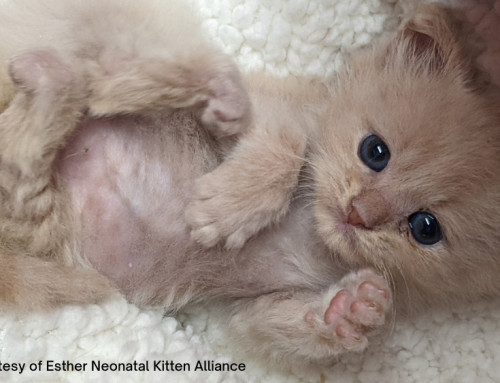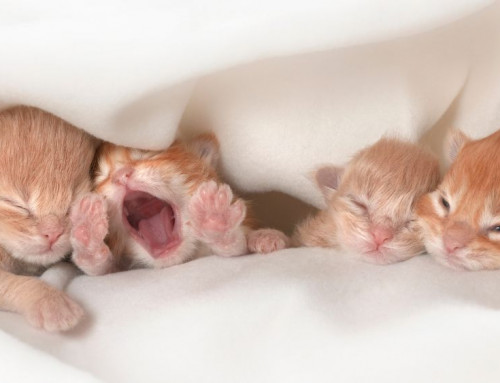Share this resource or email it to a friend!
Everyone, including kittens and cats, wants to be treated with respect. The dictionary defines respect as feeling admiration for someone and acknowledging their desires and viewpoints by putting yourself in their shoes or paws. Respect involves observing, listening and recognizing another’s needs and boundaries.
Although we think of cats as predators, it’s important to remember that cats are also prey. Like all living beings, cats want to protect themselves from harm. Respecting cats involves understanding their body language, including postures and vocalizations, as well as ours.
Frightened cats’ first instinct is to escape situations they consider threatening. If they can’t escape and feel trapped, they may hiss, growl, spit and swat; puff themselves up to look bigger; twitch their tail from side to side; and stick out their ears to the sides or press them against their head. If you don’t back off, they may fight by screaming, biting and scratching.
We as pet parents, fosters, veterinary professionals, staff and volunteers in brick-and-mortar animal shelters or home-based rescue groups should always approach a kitten or cat in a way that won’t scare them; our movements should be slow and calm and our voice quiet.
Ways to show respect to kittens and cats include:
- Handling them gently. NO scruffing. It’s only during their first weeks of life that kittens have a reflex that makes their bodies go limp when their mom scruffs them in order to carry them from place to place. Scruffing cats triggers fear and stress, not relaxation. In adult cats, a male scruffs a female during mating, after which she usually slaps him!
- Providing opportunities to express normal feline behaviors. Cat condos, trees and window seats allow cats to rest in higher places where they feel safe; posts and pads allow cats to scratch, mark their territory and enjoy a good stretch; and hidey places allow cats to get away from it all.
- Maintaining a clean litter box and placing it (or more than one if you have multiple cats) in areas where your cat feels safe. Choose a location that is not highly trafficked to provide privacy and quiet. Cats have litter preferences, so don’t run out of your cat’s litter or buy something just because it’s on sale. Make sure the litter box is easy for your cat to get to; you may prefer that it’s out of sight in the basement, but that could be a long trek for a kitten or arthritic cat.
- Moderating “noises” and odors. Cats have excellent senses of hearing and smell. Even the calmest music, if it’s played loudly, can stress them. Odors that we find pleasant, such as perfumes and air fresheners, can offend a cat’s keen sense of smell.
- Making them feel safe. Never yell, hit or throw things at your kitten or cat. Cats don’t do things for spite or revenge. A cat who pees outside the litter box may have a urinary infection; contact your veterinarian or foster coordinator. A kitten who scratches you when playing may not understand it hurts you; always use a wand toy to keep your hands far from excited kitten and cat claws.
Although Respect Your Cat Day comes once a year, it’s something to observe 24/7/365. Happy cat, happy home.










